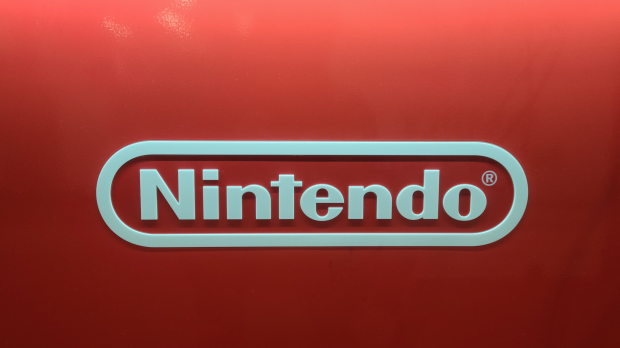The Federal Trade Commission has created a new console market that conveniently removes Nintendo from the big picture.
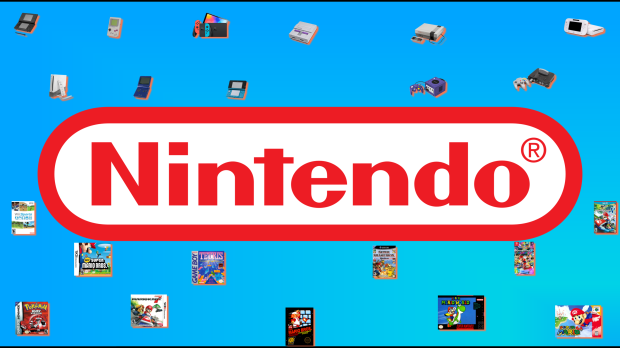
Nintendo is and always has been a major player in the console gaming space. The company is largely credited for saving the video games industry by releasing the original Nintendo Entertainment System (NES) following the Crash of 1983. Since then, From the release of the Famicom in 1983 to present day, Nintendo has gone on to sell nearly 400 million consoles (including the Switch) and over 5.4 billion games. In modern times, the Nintendo Switch has handily outsold Microsoft's Xbox One and is in second-place among the Big 3's console sales.
Any gamer knows just how big Nintendo is. However, the Federal Trade Commission has isolated Microsoft and Sony into a new "high-performance console market," cutting out Nintendo from this defined group. Instead of the Big 3, it's now the Big 2.
In its Phase 3 administrative decision opposing the Microsoft-Activision merger, the FTC defines the high-performance console market as Gen 9 systems like the PlayStation 5 and Xbox Series X/S. Since the Switch is technically a Gen 8 console because it launched in 2017 and lacks comparative power akin to its competitors' newer hardware, Nintendo is not included in this market.
It's an interesting designation to be sure, and one that seems technically sound. However, the FTC presents an incredibly myopic argument by removing Nintendo from any discussions regarding video games hardware or consoles.
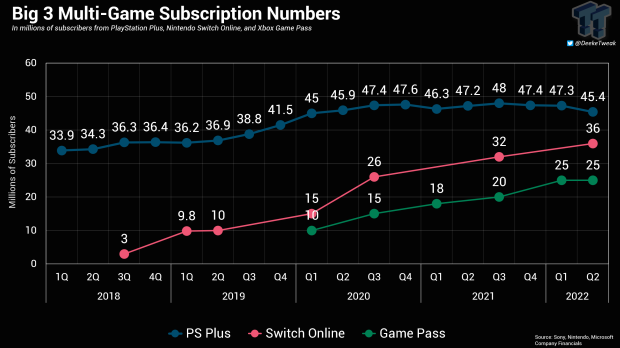
Nintendo shouldn't even be taken out of discussions regarding multi-game subscriptions, either; Nintendo Switch Online is a powerful subscription that commands 36 million subscribers and generated nearly $1 billion in revenues in 2021, as per data provided by a now-redacted CADE report.
It might be obvious why Nintendo should not be removed, but here are a few reasons based on hard data points.
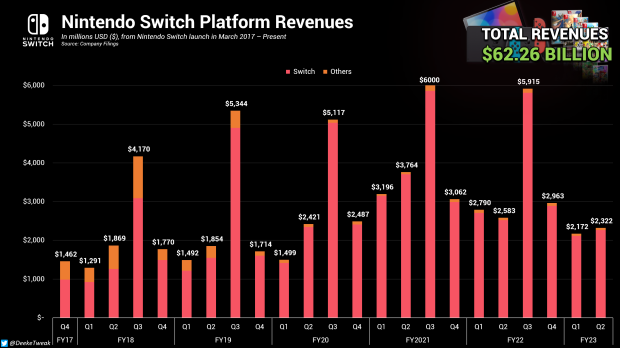
Switch is a massively popular platform - Nintendo Switch platform has generated over $62 billion in revenues and has shipped over 114 million systems as of September 30, 2022. The console is expected to beat PS4 shipments soon and will officially become the second best-selling Nintendo hardware of all time by year's end, second only to the DS' mighty 154 million sales.
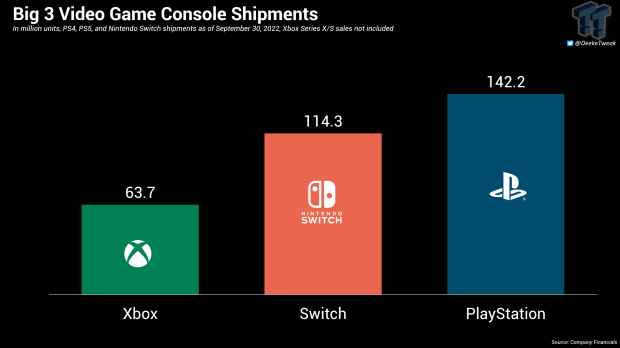
Nintendo's success pressures Sony and Microsoft - Neither Microsoft nor Sony can ignore Nintendo. There is no walled garden in which Sony or Microsoft do not have to acknowledge, respect, or consistently analyze Nintendo's business model. The same is true for Nintendo, who has taken a page out of Microsoft's playbook to offer a vast catalog of irreplacable and highly-guarded retro games to an all-you-can-play service (Nintendo Switch Online). While the Switch is dominated by major first-party family-friendly games, the platform still hosts mature content like Doom Eternal and disturbing horror games like Outlast. While Nintendo typically marches to the beat of its own drum, it is significantly dependent on third-party game sales, and Nintendo's market presence keeps Microsoft and Sony in check by reminding its competitors that there is more to gaming than free-to-play shooters and live games.
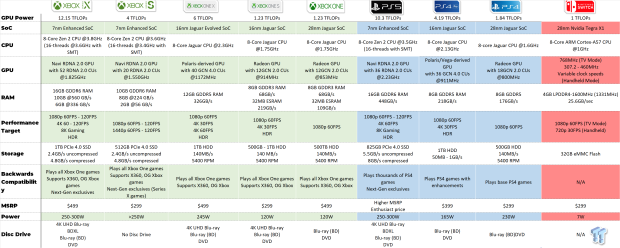
Method of access, not hardware performance, typically defines markets - Whether or not a video game machine is capable of achieving a certain spec should not restrict it from being included in a hardware market. The Switch is new enough to be a relevant and key player in the modern and present console gaming market--that it cannot perform as well as a PlayStation 5 or Xbox Series X/S does not mean it cannot compete against these platforms. It would be the same for PC gaming, a world of hardware that includes a dazzling amount of hardware permutations across decades of graphics cards and processors. Furthermore, the Nintendo Switch is a handheld machine, so does this mean the device should be categorized in its own single market? If so, Nintendo is reigns over this market as a monopolistic force (this is theoretical, we know the Switch is both a handheld and console).
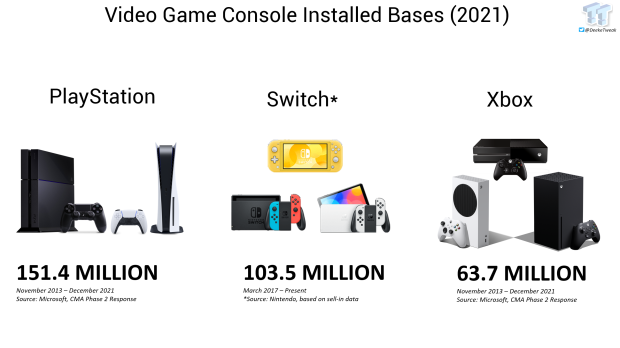
I agree with the technical designation of the high-performance console market, but in this instance, the FTC is amiss to conveniently remove Nintendo from a newly-defined market in an effort to illustrate a specific point, and to narrow the focus to Microsoft and Sony while effectively removing the second-largest console maker on the planet and considerably shrink the size, scope, and value of said market.
Here's how the FTC describes the new high-performance console market:
Page 6
Of these three console makers, PlayStation and Xbox compete in a high performance segment that includes only the most technologically advanced and capable consoles.
In November 2020, both Microsoft and Sony launched their current generation of consoles, the Xbox Series X and Series S consoles (collectively, "Xbox Series X|S") and the PlayStation 5 and PlayStation 5 Digital Edition consoles (collectively, "PS5"), respectively.
Xbox Series X|S and PS5 consoles are the only high-performance consoles available today, and are considered to be in the ninth generation of gaming consoles. In contrast, Nintendo's most recent console-the Nintendo Switch-is not a ninth-generation gaming console.
The Nintendo Switch was released in 2017, in the latter half of the eighth generation of gaming consoles, which had begun in approximately 2013. The Nintendo Switch ("Switch") also has lower computational performance, more in line with Microsoft's and Sony's eighth generation consoles.
Page 11
The Proposed Acquisition is reasonably likely to substantially lessen competition or tend to create a monopoly in the Relevant Markets for High-Performance Consoles, MultiGame Content Library Subscription Services, and Cloud Gaming Subscription Services.
The Proposed Acquisition is therefore reasonably likely to result in harm to both competition and consumers.
I. High-Performance Consoles are a Relevant Product Market
63. High-Performance Consoles are a Relevant Market for evaluating the likely competitive effects of the Proposed Acquisition.
64. The only High-Performance Consoles offered for sale today are the most recent generation of Microsoft Xbox and Sony PlayStation consoles-the Xbox Series X|S and the PS5. The Xbox Series X|S and PS5 are therefore included within the Relevant Market.
65. The third major gaming console available today, the Nintendo Switch, is highly differentiated from the Xbox and PlayStation consoles in significant ways. The Nintendo Switch, therefore, is not included in the Relevant Market.

